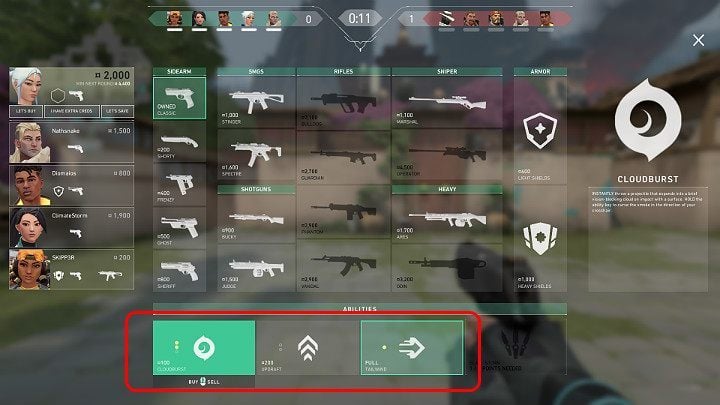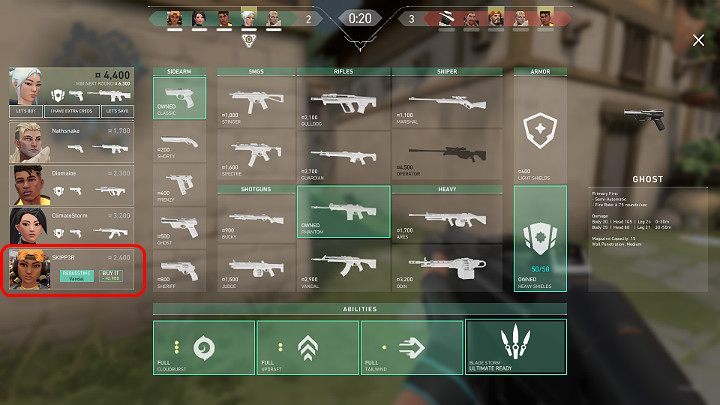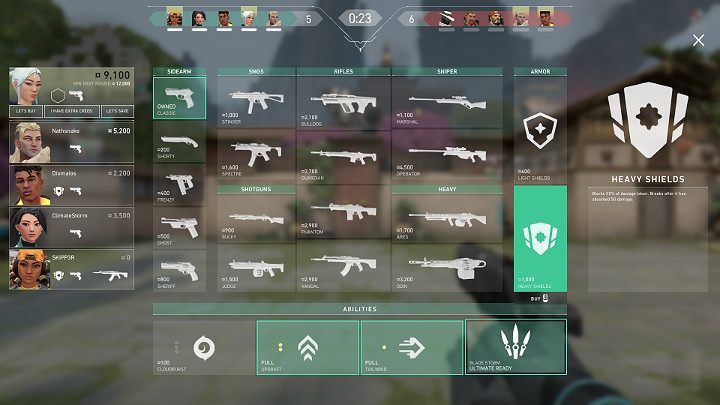Valorant: Economy - rounds, tips
Last update:
This chapter of the Valorant guide focuses on how to spend the credits earned during the gameplay. It has information on purchasing skills and weapons, purchases for allies, and details on the pistol round, economy round, and shopping round.
The proper management of credits (the in-game currency) is very important in Valorant. Each player, regardless of which side they are on (attacking or defending), starts the game with the same amount of credits (800) and a starting handgun. From that point on, each player manages his or her finances individually. Each round in Valorant begins with a shopping phase and players have a certain amount of time to purchase weapons and additional armor. Credits can be obtained in many ways, such as passive income at the end of round, additional credits for kills, planting or disarming Spike. Skillful credit management is one of the important tactical skills in Valorant.
- Buying skill charges
- Round one - pistol
- Economy round
- Shopping round
- Shopping for an ally
- Final round of the half
Buying skill charges
Each character in Valorant starts the game with one basic skill. The remaining two skills can be purchased during the game for the right amount of credits.

Purchased skill charges can be used at any time and cannot be lost, e.g. upon death. Unused skill charges are moved from one round to the next until the sides are switched.
Round one - pistol
The first round in Valorant is very important because winning it allows you to have control over at least the next few rounds. Each player starts with 800 credits and can save them for the next round or spend them on, for example:
- Additional armor - the player has enough credits to purchase light armor. It costs 400 credits and will provide extra 25 health points;
- Better pistol - Classic, the starter pistol, is a very good weapon and can kill a target with two headshots. But there are better options to choose from! For 500 credits, you can buy Ghost pistol that can kill a target with a single headshot. For 800, you can buy Sheriff - a single headshot can kill a target from any distance.
- Additional skills - some skills, such as smokescreen, may also be useful at the beginning of the game. This allows your team, for example, to plant Spike and earn additional credits in the next round.
Economy round
In this round, players don't buy anything or invest very small resources so that in the next round they can spend more credits on better weapons. Of course, the economy round cannot be written off immediately. Try to kill your opponent with the pistol and take their weapon. If you are playing as the attacking side, you can plant a Spike to get extra credits. Even if you lose a round, the whole team will get an extra reward. During the economic round, it is worth remembering a few rules:
- Don't think about losing! Always try to give your best to undermine your opponent's morale;
- Try to move together or in pairs to increase your chances of surviving or taking out a better-armed enemy;
- If opponents realize your team is playing an economy round, they may try to eliminate you one at a time - avoid open spaces, use available skills and covers (boxes, walls), always check corners;
- Before picking up a weapon dropped by your opponent, make sure you are not in an open area where you can become an easy target. Think hard about your decision.
Shopping round
A shopping round is characterized by investing a large amount of credits, sometimes even spending everything to get the right weapons and armor to win the next few rounds. The shopping round can also be divided accordingly to the current situation:
- Forced purchase - a round in which a team doesn't have enough credits but is forced to purchase a mid-shelve weapon to try not to lose the next round, which can be decisive;
- Full purchase - a round in which you have everything you need to win consecutive battles. It usually follows a series of victories.
Shopping for an ally
Players in Valorant can purchase equipment directly for another team member - there is no need to buy weapons and throw them to the ground, as in the case of Counter Strike Global Offensive. Those who want to support the team can choose the appropriate option in the store and ask others to purchase the necessary weapons.

If one of the players asks to purchase a weapon, their character will say a specific line, making it easy to recognize that someone needs a weapon. The player with enough credits can buy the equipment chosen by the ally and automatically transfer the weapon.
Final round of the half
The final round of the half is the point where you have to spend all your credits, as they will be lost after switching sides. Don't hesitate to buy heavy armor, main weapons, a better sidearm and all skill charges. Anything can come in handy in a fight.

If you have a lot of credits left after shopping, let the team know by using the command available in the left side of the shopping menu or say it in a voice chat. There will always be someone willing to use that help.
You are not permitted to copy any image, text or info from this page. This site is not associated with and/or endorsed by the Riot Games or Riot Games. All logos and images are copyrighted by their respective owners.
Copyright © 2000 - 2025 Webedia Polska SA for gamepressure.com, unofficial game guides, walkthroughs, secrets, game tips, maps & strategies for top games.
